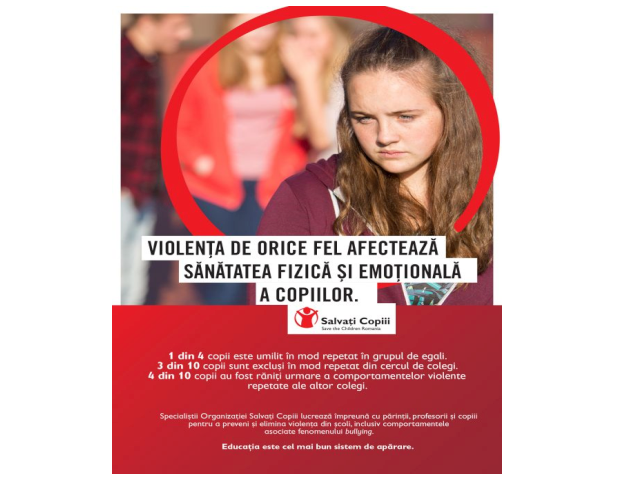Romanian Children Tackle Bullying
In 2019 a law passed against harrassment and aggression in schools

Christine Leșcu, 28.06.2022, 17:18
After many years of debates between authorities, NGOs, and parents, in 2019 a law passed against harrassment and aggression in schools. Its methodology of enforcement was published only in May 2020, during the early pandemic, which made things much harder. In spite of that, children and educators did not sit idle, and continued to find ways of combating bullying. One of the most recent such activities took place at the Childrens Forum, a project of the Save the Children organization, already in its 20th year. In fact, the project provides a context that offers the children the possibility of expressing their point of view regarding the issues they identify in their schools. In addition, this is an original project, because the opinions and recommendations provided by children are sent to the authorities that are enabled to act on them.
In 2022, the Childrens Forum met around the International Childrens Day, and Mariana Moraru, one of the coordinators of the forum, talked to us about it:
“It took place in Bucharest, where we gathered 100 children from 14 counties, including Bucharest, who focused on the issue of bullying. Even though we have a law that provides that children in schools would not be facing such phenomena, or that they would have available the mechanisms to manage them, unfortunately reality shows that there are still issues with such unfavorable interactions between children. On June 1, the international day dedicated to children, the Save the Children organization published a study showing that one of two children is exposed to one form or another of physical or emotional violence, even sexual. It is a study that shows us the magnitude of the phenomenon, and also shows us that the number of verbal and social aggression events is staying the same, if not rising. In 2017 we had another study dedicated to bullying, involving about 1.3 million children. That study showed that about 400,000 kids were subject to various forms of bullying and cyberbullying, while 200,000 of them were subject to physical violence. Unfortunately, bullying in all its forms is more present than ever, and the pandemic period definitely had an impact on the increase in the number of cases of bullying.”
Even though the figures are worrying, the increased number of reported cases surely has to do with the existence of the anti-bullying law itself, and with the fact that more and more parents, teachers, and students are more and more encouraged to report this phenomenon. Here is Mariana Moraru from Save the Children:
“It is true that this law has an important role in the increasing number of bullying cases getting reported. It is a good thing that they are getting reported. However, experience tells us that this is not sufficient. No law was ever sufficient to improve the reality in any system. What is needed is for people to have the necessary support to implement the measures provided by the law. Based on the experience we gathered by working closely with schools during this school year, I realized that we need better information for school staff, as well as for parents and students, regarding the causes of bullying and its effects, and especially the ways in which we can intervene directly. There is a lot of fear on the part of young people regarding intervention and reactions they should have in case they are involved in bullying cases, in one form or another.”
We asked Mariana Moraru what proposals were made by the young people involved in the Childrens Forum to reduce this phenomenon of aggression.
“First of all, the children believe that it is very important to have priorities regarding the measures which contribute directly to improving school climate. They also found ideas to help the collaboration between the government, ministries, and organizations, all with the aim of turning education communities into safe education communities. The categories of proposals submitted by children were based on the need for adults, but also for young people in schools of enjoying social and emotional support. Our practical discussions focused around this idea, that of the need for emotional support, and children tried to identify the way in which emotional support could be offered by different levels of authorities in the Romanian state. The children were listened to, and, with the help of moderators that accompanied kids when interacting with authorities, they emphasized the fact that this is an event that is mainly about childrens participation. It emphasized the fact that they should express their needs. Even though there is opening on the part of the authorities, it is a bit harder when it comes to putting into practice the proposals that children have.”
Therefore, the children were provided with the possibility of expressing their opinion, and be listened to by the people in the ministry and the school inspectorates. We also have to bear in mind that there will be a while until these proposals will be put into practice.






























